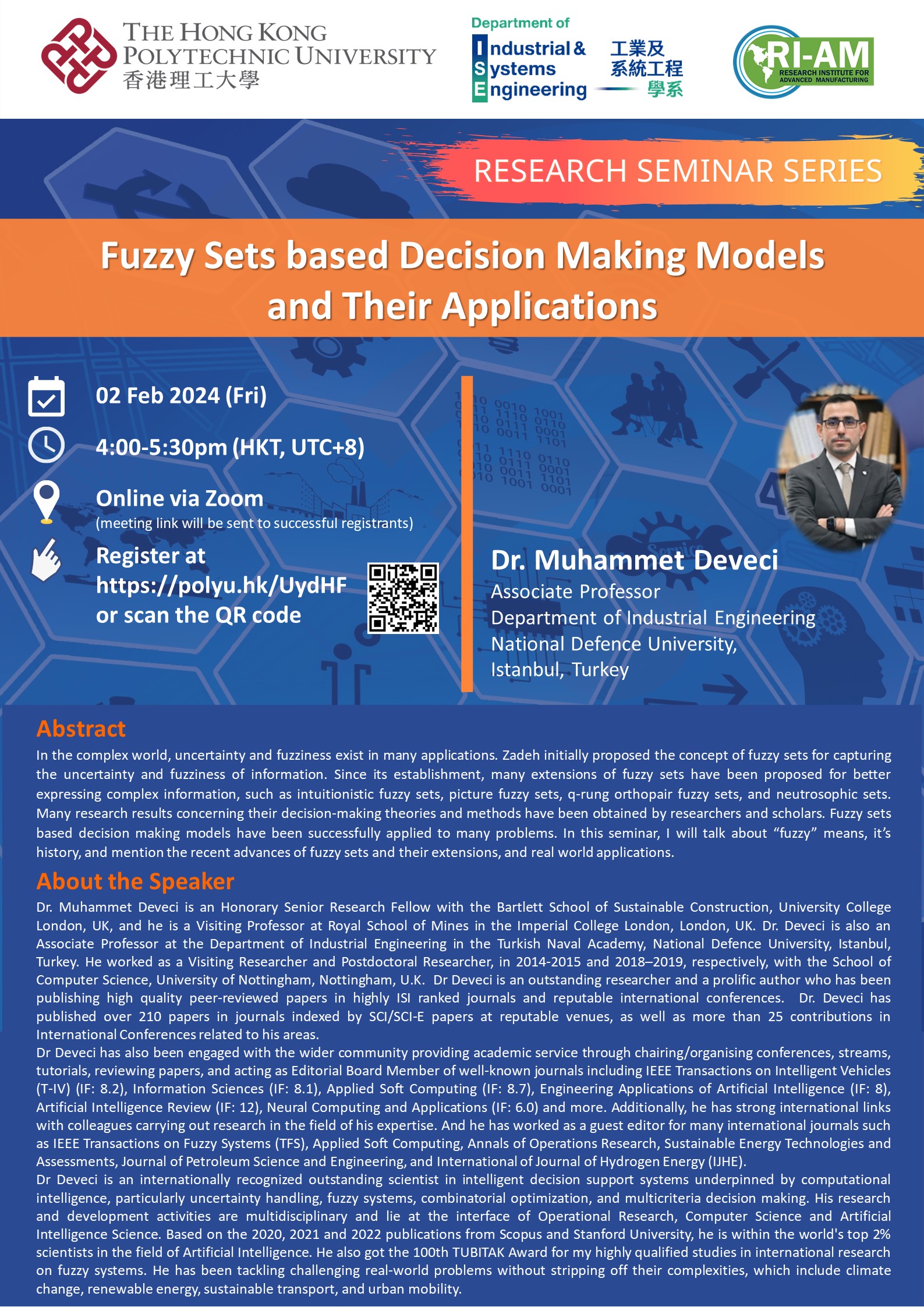Fuzzy Sets based Decision Making Models and Their Applications
Research Seminar Series

-
Date
02 Feb 2024
-
Organiser
Department of Industrial and Systems Engineering, PolyU
-
Time
16:00 - 17:30
-
Venue
Online via ZOOM
Speaker
Dr. Muhammet Deveci
Remarks
Meeting link will be sent to successful registrants
Summary
In the complex world, uncertainty and fuzziness exist in many applications. Zadeh initially proposed the concept of fuzzy sets for capturing the uncertainty and fuzziness of information. Since its establishment, many extensions of fuzzy sets have been proposed for better expressing complex information, such as intuitionistic fuzzy sets, picture fuzzy sets, q-rung orthopair fuzzy sets, and neutrosophic sets. Many research results concerning their decision-making theories and methods have been obtained by researchers and scholars. Fuzzy sets based decision making models have been successfully applied to many problems. In this seminar, I will talk about “fuzzy” means, it’s history, and mention the recent advances of fuzzy sets and their extensions, and real world applications.
Keynote Speaker

Dr. Muhammet Deveci
Associate Professor
Department of Industrial Engineering
National Defence University, Istanbul, Turkey
Dr. Muhammet Deveci is an Honorary Senior Research Fellow with the Bartlett School of Sustainable Construction, University College London, UK, and he is a Visiting Professor at Royal School of Mines in the Imperial College London, London, UK. Dr. Deveci is also an Associate Professor at the Department of Industrial Engineering in the Turkish Naval Academy, National Defence University, Istanbul, Turkey. He worked as a Visiting Researcher and Postdoctoral Researcher, in 2014-2015 and 2018–2019, respectively, with the School of Computer Science, University of Nottingham, Nottingham, U.K. Dr Deveci is an outstanding researcher and a prolific author who has been publishing high quality peer-reviewed papers in highly ISI ranked journals and reputable international conferences. Dr. Deveci has published over 210 papers in journals indexed by SCI/SCI-E papers at reputable venues, as well as more than 25 contributions in International Conferences related to his areas. Dr Deveci has also been engaged with the wider community providing academic service through chairing/organising conferences, streams, tutorials, reviewing papers, and acting as Editorial Board Member of well-known journals including IEEE Transactions on Intelligent Vehicles (T-IV) (IF: 8.2), Information Sciences (IF: 8.1), Applied Soft Computing (IF: 8.7), Engineering Applications of Artificial Intelligence (IF: 8), Artificial Intelligence Review (IF: 12), Neural Computing and Applications (IF: 6.0) and more. Additionally, he has strong international links with colleagues carrying out research in the field of his expertise. And he has worked as a guest editor for many international journals such as IEEE Transactions on Fuzzy Systems (TFS), Applied Soft Computing, Annals of Operations Research, Sustainable Energy Technologies and Assessments, Journal of Petroleum Science and Engineering, and International of Journal of Hydrogen Energy (IJHE). Dr Deveci is an internationally recognized outstanding scientist in intelligent decision support systems underpinned by computational intelligence, particularly uncertainty handling, fuzzy systems, combinatorial optimization, and multicriteria decision making. His research and development activities are multidisciplinary and lie at the interface of Operational Research, Computer Science and Artificial Intelligence Science. Based on the 2020, 2021 and 2022 publications from Scopus and Stanford University, he is within the world's top 2% scientists in the field of Artificial Intelligence. He also got the 100th TUBITAK Award for my highly qualified studies in international research on fuzzy systems. He has been tackling challenging real-world problems without stripping off their complexities, which include climate change, renewable energy, sustainable transport, and urban mobility.
You may also like















